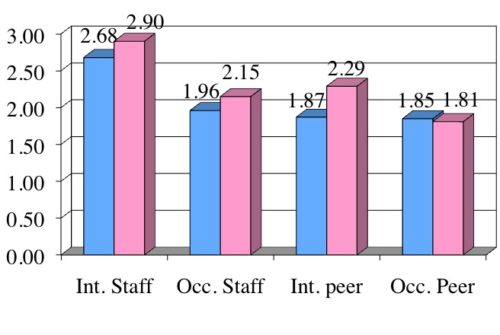
This is part of a series on Sending
Click to read the Intro and for a list of Cru’s Top Sending Campuses (with links to each post)
From 2004 to 2011 Thomas Weakley conducted a survey of all new Cru staff in order to find key factors that motivate and influence Cru Staff members to go into full time ministry (the survey was initially part of Thomas’s doctoral dissertation).
Here is a summary of his findings:
Question #1: What are the identifiable theological factors that motivate and influence Cru staff members to accept the calling of God and enter vocational Christian service?
- Only 11% had a sudden “damascus road” call to ministry. 89% had more of a progressive (over time) calling
-
- Females seem to value the process over time and their leading appears to be more intuitive than males.
- Men seemed to value the need for a more logical choice in the decisions than females.
- Thomas’s Key Takeaway:
-
- More teaching and seminars on the “calling of God” from a biblical and historical perspective need to be implemented.
Staff were asked what theological reasons motivated them to join staff:
- Lostness of Man
- Eternal Perspective
- Lordship of Christ
- Stewardship of Life
- Great Commission
- Spiritual Calling
Of these, Great Commission and Eternal Perspective were the biggest theological factors. Stewardship of Life was last.
Question #2: In what ways, if any, did personal relationship factors motivate and influence Cru staff members to accept the calling of God and enter vocational Christian service?
They were given these options:
- Current Church
- Small Group
- Peers
- Parental
- Mentor
- Professional Minister
Thomas found Peers and Mentor to be the two most influential by far.
“Ones gender did seem to impact their ranking of the relational factors. Females rated their small group and parents significantly more than males. Males rated the professional minister significantly more than females. “
Surprisingly, parents are the least important factor. Some of Thomas’ hypotheses:
- Younger adults may place a greater value upon other adults (the Cru staff mentor) replacing the parental influence.
- Parents may devalue the Parachurch organization due to their child’s responsibility to raise their personal finances for ministry.
- Current Society may have influenced parents to devalue the role of the minister.
- 82% of staff made a significant life change in college, thus parents were not part of the decision!
Thomas’s Key Takeaway:
- Consider recruitment and placement of new staff in a relational context with their peers.
Question 3:Â In what ways, if any, did mentoring factors motivate and influence Cru staff members to accept the calling of God and enter vocational Christian service?
They were given four categories:
- Intensive Staff; Occasional Staff, Intensive Peer, Occasional Peer,
And asked to rank the influence from 0-5 of mentoring relationship. Here’s the breakdown by gender:

Thomas’s Key Takeaways:
- “The value placed upon Intensive staff mentoring may imply that the lifestyle, character and calling of Cru staff is very attractive to young adults. It is significantly higher than all other categories. “
- “Since females respond well to peer mentoring incorporate more peer mentoring in the development of females.”
- “Encourage the mentoring of males by Cru staff. – Provide greater and more frequent opportunities for men to be exposed to male Cru staff mentors.”
Question #4:Â What are the identifiable ministry experiences of Cru staff during college and in what ways did these ministry experience factors motivate and influence the staff member to accept the Calling of God and enter vocational Christian service?
New staff indicate that prior ministry experiences with Cru were the most significant influencers toward them joining staff
The top 5 ministry experiences which influenced people to join staff are (in order) –
- STINT
- Interning
- International summer missions
- US summer missions
- Leading a small group on campus.
“Long term experiences (BS leader and Ministry success) rank high among females due to the holistic perspective of females.”
Question #5:Â What category of Motivational factors had the greatest influence upon the Cru staff member accepting the call of God to enter vocational Christian service?
So, of the aforementioned categories (Questions 1-4), which is the trump card?
Ranked from most influential to least (across all years):
- Ministry Experience
- Relational
- Theological
- Mentoring
In 2011 (his most recent year of research) Relational had edged ahead of Ministry Experience as most influential reason for joining staff.
One thing I’m not super clear on – isn’t mentoring essentially the same as relational?